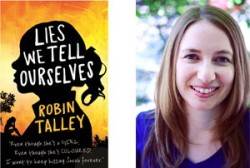On writing characters who aren't like me
Published on: 7 Hydref 2014 Author: Robin Talley
Author Robin Talley talks to us about researching historical fiction, LBGT representation in YA and effectively writing characters that don't look like you.

My first book has two main characters, each of whom narrates about half the story. Both of the characters are intelligent girls in their final year of high school. They both love to sing. They both live in a small town in Virginia in 1959. They're both on the front lines of one of the biggest political and social struggles of their time: school integration.
But they're on opposite sides of that battle. Sarah is one of the first handful of black students to enter their town's previously all-white high school. Linda, who's white, is the daughter of the town's newspaper editor, known for the editorials he pens in support of segregation. Linda has been taught that the 'separate but equal' philosophy is a vital part of her way of life ― and she's just as furious as her father that her school is being integrated.
Writing from an 'other' point of view
A few people who've read the book have asked me if it was hard to write from the point of view of a black character, since I'm white. I always tell them that yes, of course it was. It was especially difficult to write from the perspective of someone who was living through such a momentous time in history, decades before I was born. I did months of research before I ever started writing Lies We Tell Ourselves because I wanted to make sure I was telling Sarah's story as authentically as I possibly could.
After that, though, I always explain that writing from Sarah's point of view was a thousand times easier than writing from Linda's.
It's true that Linda and I are both white, and in some ways, it's easier to write about characters who have backgrounds similar to your own. But aside from race, Linda's background is very different from mine. Linda subscribes to an absolutely abhorrent belief system. She's been taught, from before she was even old enough to understand it, that white people are superior to people of all other races, and that it's therefore morally proper for white people to have absolute control over everyone else.
For much of history that was a common philosophy, but in 2014, it's incredibly difficult to wrap your brain around it. To try to see why it was once considered perfectly logical that people of different skin tones were themselves inherently different, and that they should therefore be kept separate.
I had to go through a lot of intellectual contortions while I was writing Lies We Tell Ourselves to try to understand how Linda saw the world. Then I had to figure out how to write in Linda's voice without completely alienating readers. That was another feat entirely.
'Write what you know...'
A lot of writers, especially those who are just starting out, are afraid to write from the perspective of characters who are substantially different from them. I certainly was when I was new to the game.
'Write what you know,' we're always told. Which we often extend to 'Write who you know.'
But if every writer only wrote about characters who are just like them, young adult literature would have no vampires. No brilliant teen spies. No boy wizards. No superheroes. No lion, witch, or wardrobe.
It's frightening, at first, to write from the perspective of someone who isn't like you. The prospect of writing Lies We Tell Ourselves was incredibly daunting in the beginning.
But I couldn't get the story out of my head. I had to figure out a way to write it, no matter how much it scared me. It was too big, too important, a story to stay locked inside my brain.
The importance of diversity in books
It's essential that books, especially books for children and teenagers, include as many different kinds of characters as possible. Characters who look different. Characters with different genders and gender identities. Characters who speak different languages, who live in different countries. Characters with different sexual orientations. Characters who believe things you can't imagine believing.
Books are one of the most important ways we learn about the world. For kids and teenagers in particular, books are a way to connect in depth, on an incredibly personal level, with a character, or an idea, they might've otherwise never encountered.
Whether or not they agree with that idea. Whether or not they like that character. We've got to expose readers to as many ideas and as many kinds of people as possible. Only once you know about something can you actually make an informed opinion about it.
We all want the next generation to be better than the ones that came before. We want them to embrace the whole world. There's no better way to start than with the books they read.
Topics: 12+, Historical, LGBT+, Politics/human rights, Diversity (BAME), Features






Add a comment